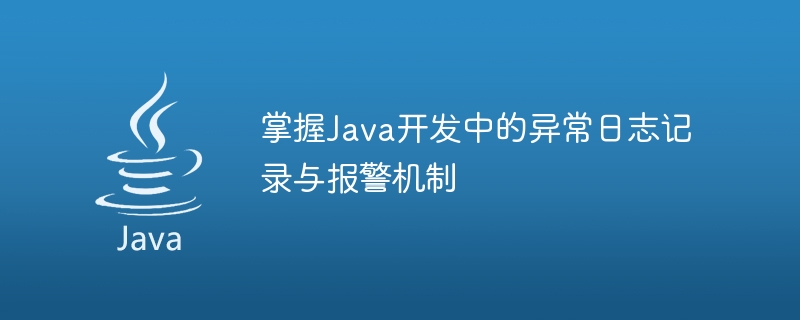

Master the exception logging and alarm mechanism in Java development
In the Java development process, exceptions are inevitable. Whether it is a system error, user input error or network failure, exceptions may cause the program to interrupt or cause unexpected errors. In order to detect and resolve exceptions in a timely manner, we need to master exception logging and alarm mechanisms.
Exception logging is a method of recording and saving exception information, which can help developers track and locate the cause of exceptions. By logging exceptions, we can learn information such as when the exception occurred, stack trace, exception type, and error message. This information is very helpful in analyzing and resolving exceptions.
In Java development, we can use the logging framework to record exceptions. Commonly used logging frameworks include Log4j, Logback and SLF4J. These frameworks define the format and destination of log output through configuration files. We can output exception logs to the console, file, database or remote server. With appropriate configuration, we can selectively record exception logs at different levels to meet different needs.
In order to make better use of exception logging, we can add a try-catch statement block to the code to catch exceptions and record exception information in the catch statement. For example:
try {
// 代码可能出现异常的地方
} catch (Exception e) {
// 记录异常日志
logger.error("Exception caught!", e);
}In this example, we use the logger.error() method to record exception information. This method accepts two parameters, the first parameter is the log message, and the second parameter is the exception object. By adding the exception object as the second parameter, we can log the exception stack trace information to the log. In this way, when an exception occurs in the program, we can view the exception information in the log to better understand the cause of the exception.
In addition to exception logging, we can also use the alarm mechanism to promptly notify developers of exceptions. When an exception occurs, the system can send alert text messages, emails, or notifications to developers. In this way, developers can handle exceptions as soon as possible and improve the system's response speed and user experience.
In order to implement the alarm mechanism, we can use third-party alarm tools, such as Alibaba Cloud's cloud monitoring, Tencent Cloud's cloud monitoring, Prometheus, etc. These tools can help us monitor the operation of the system in real time and send alarm notifications when abnormalities occur.
When using the alarm mechanism, we need to define the conditions for triggering the alarm, such as abnormal frequency, abnormal duration, etc. Only when these conditions are met will the system trigger an alarm. In this way, we can reduce false alarms and improve the accuracy and reliability of alarms.
To sum up, mastering exception logging and alarm mechanisms is an important skill in Java development. Exception logging can help us track and locate exceptions and quickly solve problems; and the alarm mechanism can promptly notify developers of exceptions and improve the system's response speed. By rationally using exception logging and alarm mechanisms, we can improve the stability and maintainability of the system and enhance user experience.
The above is the detailed content of Master the exception logging and alarm mechanism in Java development. For more information, please follow other related articles on the PHP Chinese website!
 Introduction to interface types
Introduction to interface types
 How to resize pictures in ps
How to resize pictures in ps
 What to do if postscript cannot be parsed
What to do if postscript cannot be parsed
 Win10 does not support the disk layout solution of Uefi firmware
Win10 does not support the disk layout solution of Uefi firmware
 What are the oracle wildcards?
What are the oracle wildcards?
 Detailed explanation of sprintf function usage
Detailed explanation of sprintf function usage
 What are the four big data analysis tools?
What are the four big data analysis tools?
 How to connect asp to access database
How to connect asp to access database




